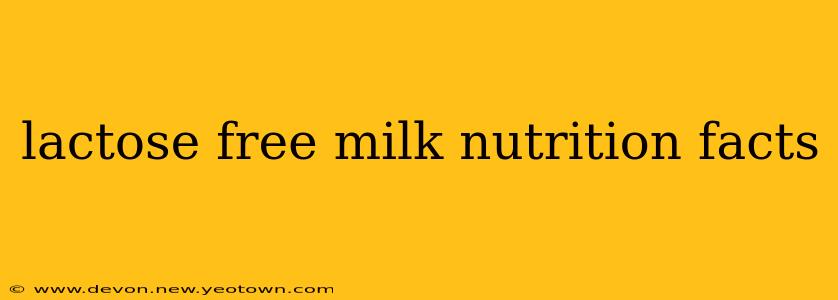Let's be honest, milk is a staple in many diets. But for millions, the simple pleasure of a glass of milk is impossible due to lactose intolerance. The good news? Lactose-free milk offers all the creamy goodness without the digestive distress. But what exactly is lactose-free milk, and how does its nutritional profile stack up against traditional cow's milk? Let's dive in.
This isn't just a quick rundown; we'll explore the nutritional differences, answer your burning questions, and even tackle some common misconceptions. Get ready to become a lactose-free milk expert!
What is Lactose-Free Milk?
Imagine a world where you can enjoy the creamy goodness of milk without the bloating, cramps, and gas. That's the promise of lactose-free milk. This isn't a different type of milk altogether; it's regular cow's milk that has undergone a process to remove lactose, the sugar that causes problems for people with lactose intolerance. This is typically done by adding the enzyme lactase, which breaks down lactose into simpler sugars, glucose and galactose, making it easier to digest.
The process itself doesn't significantly alter the milk's nutritional content. So, if you're looking for a dairy alternative that closely mirrors the taste and nutritional benefits of regular milk, lactose-free milk is a great choice.
Lactose-Free Milk vs. Regular Milk: A Nutritional Comparison
The key difference lies in the lactose content. Regular milk contains lactose, while lactose-free milk has virtually none. Otherwise, the nutritional profiles are remarkably similar. Both are excellent sources of calcium, vitamin D, and protein – essential nutrients for strong bones and overall health.
How Does Lactose-Free Milk Compare to Other Milk Alternatives?
This is where things get interesting. Many people turn to plant-based milks like almond, soy, or oat milk as lactose-free alternatives. However, the nutritional content varies significantly. While some plant-based milks are fortified to mimic the calcium and vitamin D content of cow's milk, they often lack the protein content and might not provide the same range of nutrients. Lactose-free milk, on the other hand, retains the complete nutritional profile of regular cow's milk, just without the lactose.
Is Lactose-Free Milk Good for People Who Aren't Lactose Intolerant?
Absolutely! There's no harm in consuming lactose-free milk if you don't have lactose intolerance. It offers the same nutritional benefits as regular milk, and some people find that it's easier on their digestive system, even if they don't experience the typical symptoms of lactose intolerance.
Does Lactose-Free Milk Taste Different from Regular Milk?
Many people can't even tell the difference! The process of removing lactose is subtle and doesn't significantly impact the taste or texture. However, some brands might have a slightly sweeter taste due to the added glucose and galactose.
What are the Health Benefits of Lactose-Free Milk?
The health benefits largely mirror those of regular milk. These include:
- Strong bones: The high calcium content is crucial for bone health and preventing osteoporosis.
- Muscle building: The protein in lactose-free milk supports muscle growth and repair.
- Nutrient absorption: Vitamin D aids in calcium absorption.
- Digestive comfort: This is the primary benefit for those with lactose intolerance.
Are there any downsides to drinking lactose-free milk?
The main downside is the slightly higher cost compared to regular milk. Beyond that, the only potential issue is the added sugar in some brands – always check the label for added sugars.
Conclusion: A Delicious and Healthy Choice
Lactose-free milk is a fantastic option for people with lactose intolerance, providing the same great taste and nutritional benefits as regular milk without the digestive discomfort. It's also a viable choice for those who simply prefer a milk that's easy on their stomachs or who are looking for a convenient and nutritious way to meet their daily calcium and protein needs. So, next time you're at the grocery store, consider giving lactose-free milk a try – your gut will thank you!

